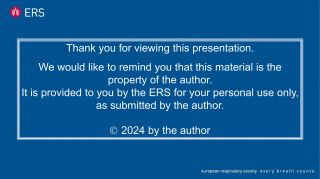3rd edition of ERS-ALAT Webinars in Respiratory Medicine
15 April, 2024 | Online
18:00-19:00 CEST
Chairs: Prof. Dr Joanna Chorostowska-Wynimko (Warsaw, Poland), Dr Santiago Auteri (Rosario, Argentina)
Speakers: Dr Georgia Hardavella (Athens, Greece), Prof. Sara Tomassetti (Florence, Italy), Dr Claudio Martin (Buenos Aires, Argentina)
Discussant: Prof. Dr Argyris Tzouvelekis (Patras, Greece)
Fees: Free for ERS members and non-members
Educational aims
CT screening can identify lung cancer at an earlier and more treatable stage, potentially enhancing outcomes.
Studies indicate a reduced mortality rate among high-risk individuals who undergo regular screening compared to those who do not. The preferred method for lung cancer screening is low-dose CT (LDCT), which entails capturing X-ray images from various angles to generate detailed cross-sectional images of the lungs.
Patients with interstitial lung disease (ILD) across different subtypes face an elevated risk of developing lung cancer. Diagnosing and treating lung cancer in individuals with ILD present particular challenges. Research has demonstrated an association between interstitial lung abnormalities (ILA) and critical clinical outcomes, including increased mortality and lung cancer incidence. Detecting ILA may enable an earlier diagnosis of ILD and optimize the benefits of anti-fibrotic therapies developed in the last decade.
The extent of lung function impairment due to ILD may hinder surgical resection as a definitive therapy for early-stage lung cancer. Patients with ILD also have an increased risk of developing pneumonitis from chemotherapy, immunotherapy, and radiotherapy. While systemic therapy has been a standard component of localized and advanced lung cancer treatment, selecting appropriate regimens for patients with non-small cell lung cancer (NSCLC) and concurrent ILD is a complex task. Chemotherapy, certain targeted therapies, and immunotherapies carry the risk of inducing acute exacerbation of underlying ILD or pneumonitis. Studies suggest that 5%-20% of ILD patients may experience acute exacerbation during chemotherapy, with potentially fatal consequences.
Implementing standard-of-care systemic therapy for lung cancer treatment in ILD patients may not always be feasible due to toxicity concerns. Immune checkpoint inhibitors (ICIs) have demonstrated improved overall survival in lung cancer patients; however, ICI-associated pneumonitis is a serious and sometimes fatal adverse effect. Moreover, the risk of pneumonitis is a critical consideration for all patients undergoing thoracic radiotherapy, especially in those with pre-existing ILD.
Topics
- Screening for Lung Cancer - Georgia Hardavella
- ILAs and their importance in Lung cancer - Sara Tomassetti
- Treatment of Lung Cancer in patients with fibrosing ILD - Claudio Martin
Target audiences
- Pneumologists (Generalists and specialists in ILDs and lung cancer)
- Medical Oncologist
- Radiation Oncologists
- Clinicians
- Thoracic Surgeons
- Trainees
- Early Career Members
Learning Outcomes
- Enhanced Understanding of Early Detection Strategies:
Participants will acquire a comprehensive understanding of the combined role of low-dose CT (LDCT) in lung cancer screening and smoking cessation, including its ability to detect lung cancer at earlier, more treatable stages. They will be able to apply this knowledge to identify high-risk individuals and recommend appropriate screening measures, potentially leading to improved patient outcomes. They will be able to apply this knowledge in patients with ILDs. - Advanced Knowledge in Managing Lung Cancer with Interstitial Lung Disease (ILD):
Attendees will develop advanced knowledge regarding the challenges in diagnosing and treating lung cancer in patients with ILD. This includes recognizing the association between interstitial lung abnormalities (ILA) and clinical outcomes, understanding the implications of ILD histological confirmation, surgical resection and systemic therapy, and evaluating the risks associated with chemotherapy, immunotherapy, and radiotherapy in ILD patients. - Informed Decision-Making for Lung Cancer Treatment in Patients with ILD:
Participants will gain the skills to make informed decisions when selecting systemic therapy regimens for patients with non-small cell lung cancer (NSCLC) and concurrent ILD. This includes assessing the risks and benefits of chemotherapy, targeted therapies, and immunotherapies, as well as understanding the potential complications such as acute exacerbation of ILD or pneumonitis. This knowledge will enable healthcare professionals to tailor treatment plans for improved patient safety and outcomes and balance the benefits and risks to ensure patients reach an informed decision.

